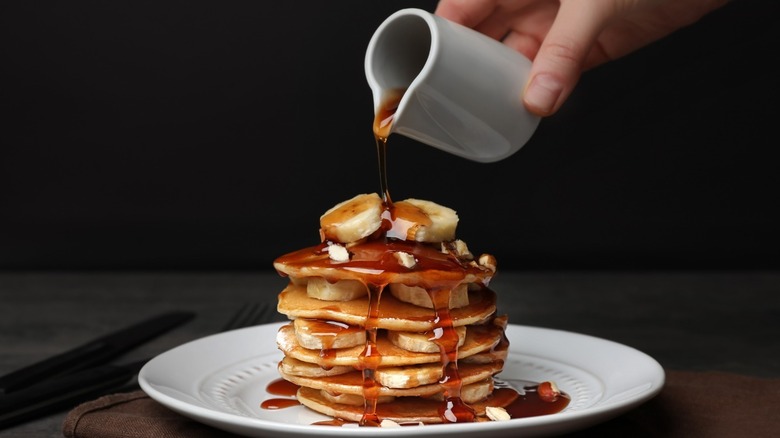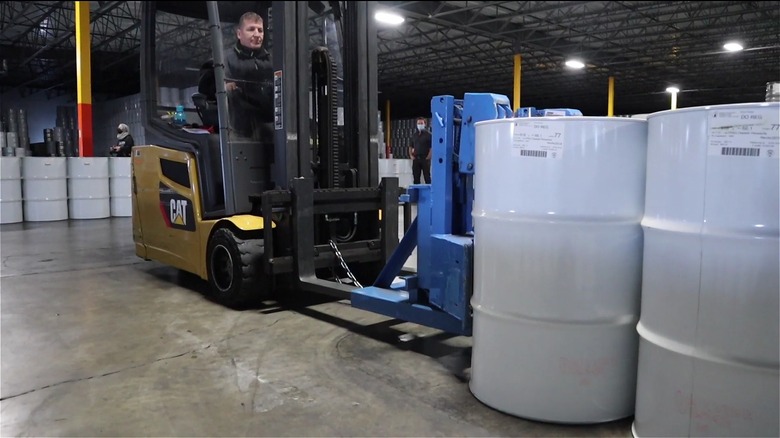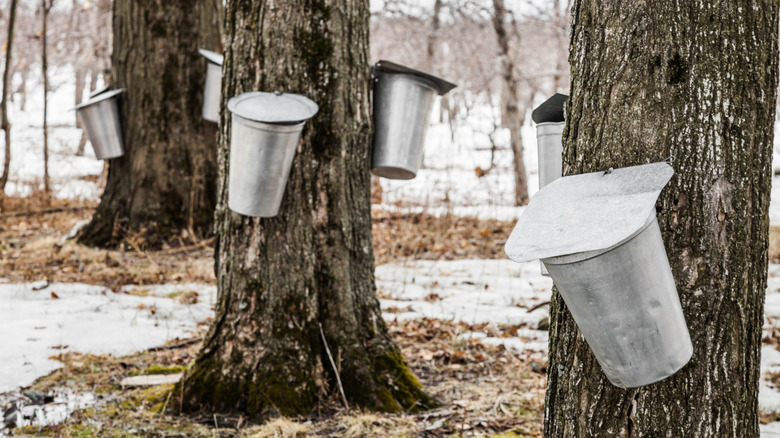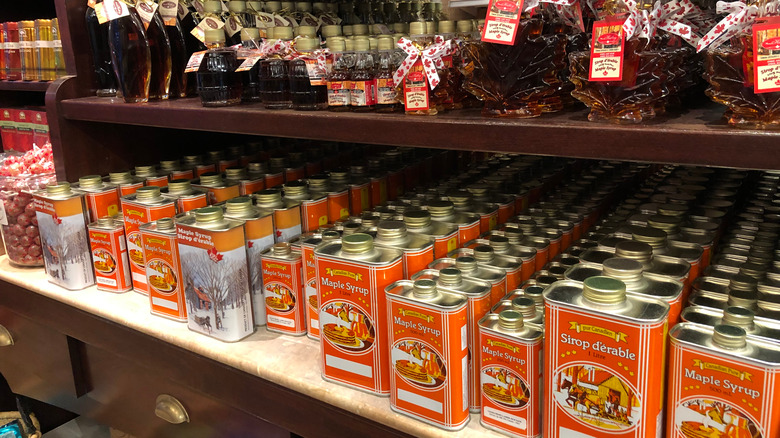Everything You Need To Know About Canada's Huge Maple Syrup Heist
When you think of an earth-shattering theft at a reserve, you may think that someone has stolen oil, gold, or even a herd of elephants. It's unlikely that you'll conjure up images of a condiment squirreled away by the ton. It turns out that in Laurierville, Quebec, a community about 45 miles from Quebec City, there lurks a giant font of tree sappy goodness — the only emergency maple syrup reserve on the entire planet, according to the CBC.
Normally off-limits to the public eye, the reserve recently invited members of the media to cast their eyes on the four buildings in which the syrup is stored. Filled with mountainous walls of precision-stacked white barrels, the facility can hold up to 94,000 with each one boasting 45 gallons of this maple indulgence (per FPAQ). When production is low and demand is high, it's time to dig into the stockpile to meet demand. When production outpaces demand, the excess gets stored for future years. With Quebec producing approximately 70% of the world's maple syrup, it makes sense that they would want to manage this hefty export.
There's just one problem. What happens when someone embraces the notion to steal some of this amber nectar-of-the-gods, and you're storing it all in one place?
Meet the so-called 'OPEC' of maple syrup
First, it's important to explain who looks after managing this reserve and the maple syrup industry in Quebec — the Federation of Québec Maple Syrup Producers (FPAQ). Several sugar shack operators view "The Federation" as the bad guys, tightly controlling the flow of maple syrup within the province. In fact, it has been described as "an ironfisted cartel" and compared to OPEC (per Vanity Fair). And taking back control of their sugar shacks and returning to an open market is the goal of these frustrated producers. Some have rebelled by selling their maple syrup on the black market, sneaking their wares out of their sugar shacks under the cover of darkness. The federation, in turn, has responded by posting guards and having inspectors do surprise visits, checking financial records and production logs (National Post).
But the biggest act of defiance was about to occur in a warehouse in Saint-Louis-de-Blandford, a small community two hours outside Montreal. And this heist would not only go down in history for its sheer value but also because of its unlikely target.
A rather small group pulled off this massive heist
Avik Caron's spouse was a co-owner of a warehouse that the federation was using to store its barrels of maple syrup. In fact, it is purported that it was Caron, himself, who conjured up the notion of stealing the barrels' contents and that he approached Richard Vallières with his brainchild (per Montreal Gazette). Sébastien Jutras drove the truck to transport the syrup (via the Toronto Star). Vallières, a well-known "barrel roller" — someone who has mastered the art of operating outside the federation's regulations — had been active in the black market dealing in maple syrup for years. He arranged for a "legitimate maple syrup operation in New Brunswick" to distribute the product, according to the Canadian Encyclopedia.
The thieves would go to the sugar shack of Raymond Vallières, siphon off the maple syrup, and replace it with lake water for part of 2011 and 2012 until their theft was discovered in a surprising way. As Forbes shared, the crime came to light in the summer of 2012 when an inspector attempted to mount a stack of barrels that should have been tough to budge. It not only budged but came close to falling. It turns out that some of the barrels were filled with water and others were completely empty. After further investigation, it was determined that more than 9,500 barrels (about 3000 tons of liquid money) had gone missing.
You won't view maple syrup the same way again
So what were 9,500 barrels of maple syrup worth? Approximately $14.3 million U.S., even though Vallières claims he only sold it for $7.9 million, leaving himself with a $795,000 dollar profit in US currency (per CTV Montreal). $14 million or $7.9 million — either way, that's not small sweet potatoes.
Richard Vallières received an 8-year prison sentence and a fine of $10 million Canadian (or $7.9 million US.) After revisiting the case, a court further stipulated that his sentence would be extended by six years if he fails to pay his fine within a 10-year period (via the CBC). Sébastien Jutras was incarcerated for eight months. Avik Caron must pay a roughly $955,000 ($1.2 million CAD) fine and spend 5 years in jail. Global News says the New Brunswick maple syrup purveyor, Etienne St. Pierre, was sentenced to "two years minus one day, to be served in the community, as well as three years probation" and a fine of just over $1 million (of $1.3 million CAD). And, Raymond Vallières received a six-month stint in jail and a penalty of $7,832 ($9,840 CAD). These hefty fines and jail terms surely illustrate that crime doesn't pay — no matter how sweet.
So, the next time you're standing in the sugary condiment aisle at your local grocery store, remember that this is not simply your average breakfast syrup. After all, people have gone to jail over it.



